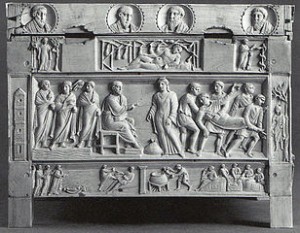Discomforting Jesus – Acts 9:1-19
 Comfort is a desirable and good thing to have. Yet, it can easily become the focus of our lives. This has always been the truth. Yet, it is even more so in a society where new products are constantly marketed to consumers demanding greater ease and comfort. Consumer-oriented cultures like ours have to watch out lest we subject Jesus to supply the same sort of demand. That is because Jesus, the Prince of Peace, has always been in the business of discomforting his disciples for the purpose of bringing them better comfort.
Comfort is a desirable and good thing to have. Yet, it can easily become the focus of our lives. This has always been the truth. Yet, it is even more so in a society where new products are constantly marketed to consumers demanding greater ease and comfort. Consumer-oriented cultures like ours have to watch out lest we subject Jesus to supply the same sort of demand. That is because Jesus, the Prince of Peace, has always been in the business of discomforting his disciples for the purpose of bringing them better comfort.
Nowhere is this more evident than in the conversion account of Saul, otherwise known as the Apostle Paul, which is repeated three times in Acts (9, 22, 26). Saul’s encounter with Jesus on his way to imprison Christians was not a tranquil, peaceful and easy moment. Jesus brought real discomfort into his life, causing Saul to face up to real yet difficult realities. Yet, Jesus did this wisely and at the precise time that his discomforting presence would have the greatest positive effect. Saul went on to experience greater comfort than he had previously known: God has put on sandals in Jesus and stepped into the abyss for his enemies; Jesus seeks his enemies out to let them know it; Jesus turns his enemies into shining trophies of his love by employing them in his mission. In this case he employed Saul in making Jesus’ severe kindness known throughout the then known world and writing a great deal of the New Testament.
The Jesus of today is the same Jesus of the first century. He still will make us uncomfortable as we relate to him. The discomfort he brings is intended to bring about transformation and ultimate comfort. Yet, if we demand a Jesus that only brings ease, tranquility and a word of peace then we will not be dealing with him as we ought. And we will not grow as we ought. At moments of discomfort or stress we may even be ignoring him as the one who is seeking to encounter us with something we need to pay attention to.
So, may I ask you: where is it most uncomfortable for you to relate to Jesus? When do you most desire to not be associated with him: family, friends, co-workers, online chats? Why does it make you uncomfortable? Where does he want you to grow?
Your discomfort doesn’t surprise him. His grace is sufficient for us all. Let us humble ourselves with him, persevere through the difficulties and he will bring us out shining as a trophy of his mercy.
The featured painting is Thomas Kinkade’s Perseverance.



 Last week we learned that the book of Acts plays a key part in the unfolding drama of God’s work to restore his creation through Jesus Christ. As the church today we must, like the disciples in Acts, live faithfully, creatively and glocally. That is to say we must know where we are at in the drama (after Pentecost and before the second coming), creatively speak and act in keeping with where we are, and be mindful that the stage upon which the drama is playing out is global even as we improvise locally.
Last week we learned that the book of Acts plays a key part in the unfolding drama of God’s work to restore his creation through Jesus Christ. As the church today we must, like the disciples in Acts, live faithfully, creatively and glocally. That is to say we must know where we are at in the drama (after Pentecost and before the second coming), creatively speak and act in keeping with where we are, and be mindful that the stage upon which the drama is playing out is global even as we improvise locally. It’s either this or it’s that, but it can’t be both, right? Some things really are life or death, black or white, good or bad, apples or oranges. Dichotomies can be helpful. Dichotomies can also be unhelpful or false. God’s people have been known to make unhelpful distinctions between their “spiritual life” and their “home life”, “social life”, etc. When I recently asked a friend of mine in the Carolina’s what he thought Christians meant by their “spiritual life” he said, “Quiet times, prayer time and Sundays”. Is this really what constitutes Biblical spirituality? Is true spirituality just the private time we have with God? Is spirituality only about those specific times we gather with others to do religious things and focus on the desires of the soul? Or, is spirituality about the body AND the soul? Does it concern the private AND the public life? And finally is spirituality wholly a work of man OR fully the work of God?
It’s either this or it’s that, but it can’t be both, right? Some things really are life or death, black or white, good or bad, apples or oranges. Dichotomies can be helpful. Dichotomies can also be unhelpful or false. God’s people have been known to make unhelpful distinctions between their “spiritual life” and their “home life”, “social life”, etc. When I recently asked a friend of mine in the Carolina’s what he thought Christians meant by their “spiritual life” he said, “Quiet times, prayer time and Sundays”. Is this really what constitutes Biblical spirituality? Is true spirituality just the private time we have with God? Is spirituality only about those specific times we gather with others to do religious things and focus on the desires of the soul? Or, is spirituality about the body AND the soul? Does it concern the private AND the public life? And finally is spirituality wholly a work of man OR fully the work of God?